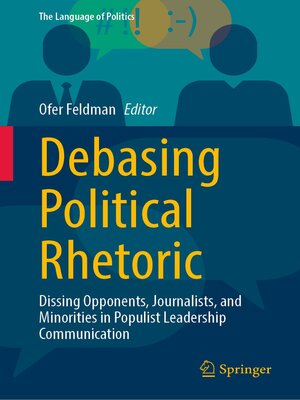Debasing Political Rhetoric
ebook ∣ Dissing Opponents, Journalists, and Minorities in Populist Leadership Communication · The Language of Politics
By Ofer Feldman

Sign up to save your library
With an OverDrive account, you can save your favorite libraries for at-a-glance information about availability. Find out more about OverDrive accounts.
Find this title in Libby, the library reading app by OverDrive.



Search for a digital library with this title
Title found at these libraries:
| Library Name | Distance |
|---|---|
| Loading... |
This book is a companion to Political Debasement: Incivility, Contempt, and Humiliation in Parliamentary and Public Discourse. It brings together interdisciplinary contributions to provide a comprehensive and detailed exploration of the nature, function, and effect of debasement language used by selected political leaders in Western and non-Western countries. Among them are Donald Trump (in the USA), Recep Tayyip Erdoğan (Turkey), Rodrigo Roa Duterte (Philippines), Jair Bolsonaro (Brazil), Abe Shinzô (Japan), Pauline Hanson (Australia), Kyriakos Mitsotakis (Greece), Geert Wilders (the Netherlands), Beppe Grillo (Italy), and Santiago Abascal (Spain). Chapters focus specifically on the language of these leaders while examining debasement discourse from narrow and broad perspectives. The former includes the use of crude or abusive language (e.g., curses, obscenity, and swearing) to demean, humiliate, mock, insult, or belittle, based on the actual or perceived object or entity (e.g., race, religion, national, gender identity, or sexual orientation); the latter includes the use of devious or indirect irony, sarcasm, cynicism, ridicule, subtlety, and understatement to degrade and discredit other individuals or groups. The book represents the collective wisdom of scholars and researchers, experts in fields such as communication, political science, international relations, and social and political psychology. Cumulatively, the authors develop a global analysis of debasement discourse in societies from West to East and offer a cutting-edge approach to expand a framework assessing the role and effect of such rhetoric in contemporary politics.







